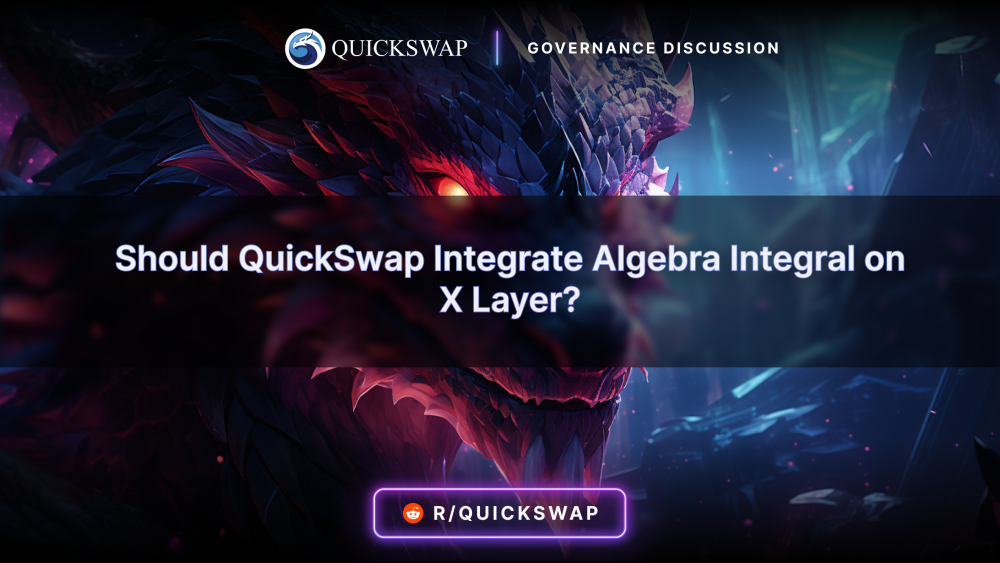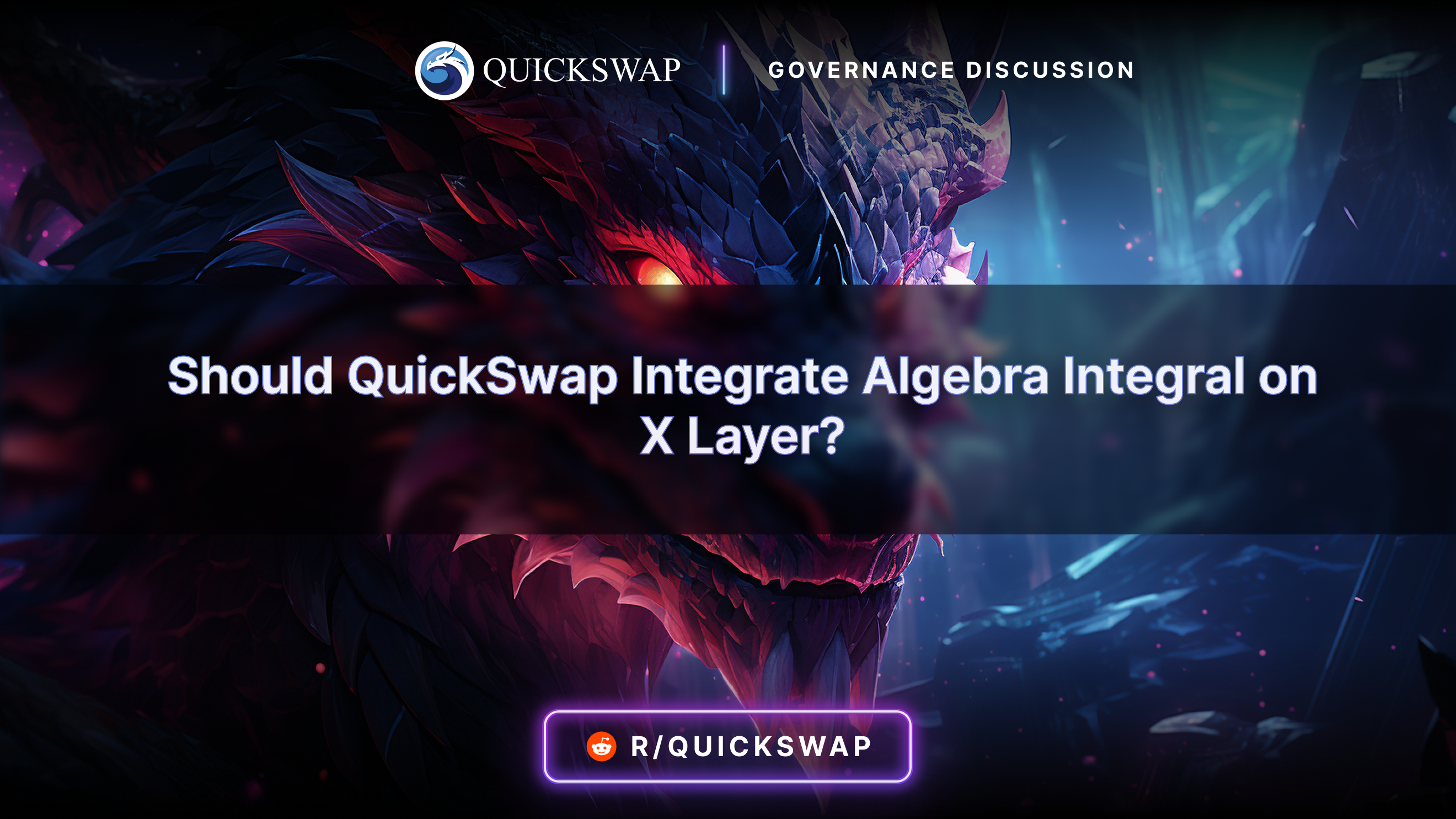As the leading DEX on Polygon and an influential name in the crypto and DeFi space, QuickSwap has always strived to deliver the best and latest, high quality tech to its community and users.
QuickSwap currently uses Algebra contracts on Polygon PoS, Polygon zkEVM, X Layer, and Dogechain to provide users with a top-notch concentrated liquidity tech. However, as the landscape is evolving, the DEX is looking to implement the newest technology to keep up with current trends and demand.
Algebra has released Integral, its V4 modular architecture with core code that utilizes plugins/hooks to set a new standard in DeFi. Integral allows DEXs to separate their most vulnerable aspect (liquidity storage) and peripheral functionality modules (i.e. oracles, fee calculation) from each other.
In layman's terms, plugins/hooks are a new phenomenon that Algebra has introduced where another protocol can build something specifically for an LP on a DEX that is more customised and specific, such as fee systems, dynamic fees, on-chain farming, and more.
Traditionally on DEXs, any changes made to liquidity pools (such as fees) apply to all of them. With plugins/hooks, DEXs can host separate LP pairs that are unique and built by different protocols - the LPs can contain special characteristics that were not previously available.
This is essentially Algebra’s version of Uniswap V4 and is an important upgrade across the entire DeFi space for protocols across all ecosystems. QuickSwap is looking to adopt this codebase to advance faster, become more flexible for its LPs, implementing the latest and greatest tech.
For this governance proposal, the dragon community must discuss and vote whether QuickSwap should integrate Algebra Integral on X Layer, OKX’s flagship Layer 2 chain built using the Polygon CDK tech stack.
TL;DR:
- Algebra has recently released Integral, which is its V4 modular architecture using plugins/hooks that allow other protocols (or the DEX itself) to build features specifically for a liquidity pool that is more customised and specific
- This technology is the latest and greatest on the market and allows protocols/DEXs to be much more fluid, versatile, and adaptable when it comes to keeping up with the most recent DeFi trends
- QuickSwap is looking to integrate Algebra Integral on X Layer, its latest chain deployment which is OKX’s flagship Layer 2 network built using Polygon CDK tech
- To begin, the governance discussion on the official QuickSwap Reddit will run until Monday, July 8 at 7:00 AM UTC
- Once the Reddit discussions finish, a formal Snapshot vote will begin and run from Monday, July 8 at 7:00 AM UTC until Friday, July 12 at 7:00 AM UTC
- Once you’ve read this entire blog post, make sure to visit the official QuickSwap Reddit discussion forum to share your perspective with your fellow community members

What is Algebra’s Integral?
Algebra is a DEX Engine that provides V3 (concentrated liquidity & dynamic fees) and V4 (modular architecture with core code + plugins/hooks) AMM codebases to QuickSwap and over 20 different DEXs.
Their Integral product is an AMM (Automated Market Maker) with concentrated liquidity that also supports the use of plugins. As mentioned above, the concept of Integral is the separation of pools and extra functionality via a modular architecture - it’s the latest approach to concentrated liquidity that allows for the seamless integration of plugins on top of liquidity pools.
Here are some other core features of Integral and its underlying code:
- Manages liquidity pools and basic DEX operation mechanics
- Minimises waste gas by streamlining gas fees and boosting efficiency
- Plugins that expand DEX functionality & address the codebase’s inflexibility issues
More information can be found here can be found here.

How Do Plugins/Hooks Work?
Algebra Integral introduces custom plugins that allow for special features for DEXs to adapt to specific functionalities in a far more customisable way. These plugins are smart contracts that connect to a liquidity pool contract to enable actions on the blockchain such as adjusting pool fees, performing extra checks, calling other contracts, etc.
The Integral codebase already has ready-to-use plugins for DEXs, such as a TWAP Oracle for historical data, volatility-based fees, and farming. 1 contract can be connected to a liquidity pool as a plugin at once - however, the customisation of the functionalities available can be as minimal or intricate as desired.
Here’s how it works in more detail:
Plugins interact with pools using Algebra Integral via hooks, which are specific calls that the pool can make prior to and after user actions. If a plugin is attached to the pool and the specific call to that hook is activated, the pool will call a function defined in the Algebra plugin interface from the plugin. Within this function, arbitrary logic can be implemented in the plugin, including even interaction with the same liquidity pool.
Essentially, hooks and plugins are interchangeable, allowing information to be exchanged to and from the liquidity pool. The set of possible Hooks corresponds to the following events: initialisation of a liquidity pool, liquidity mint or burn, swap, and flash loan.
Implementing a plugin can be done by developers or the actual protocol/DEX to suit whatever the desired needs are. Learn more //medium.com/@crypto_algebra/algebra-integral-plugins-technical-overview-315e6e7bc72f" style="text-decoration: none;">here.

Algebra Integral Integration on X Layer
If the community were to vote in favor of this proposal, QuickSwap would integrate Algebra Integral (V4 tech) on X Layer, the newest Layer 2 Polygon CDK chain to be deployed on the DEX.
X Layer is one of the most popular and growing Layer 2 chains in the entire DeFi ecosystem, connecting the OKX and Polygon communities. QuickSwap, the leading DEX on all Polygon chains, has the potential to drive even more adoption for its liquidity pools on X Layer if it were to integrate Algebra Integral.
Enabling plugins and hooks on X Layer via QuickSwap would allow for much more customisation when it comes to liquidity pool features for different supported pairs. As traction for X Layer grows on the dragon DEX and existing/new projects begin adding more liquidity on the network, having the flexibility and robustness of the Integral codebase will be even more essential.
The reason why QuickSwap wants to launch Algebra Integral on X Layer first is two fold: it’s a brand new Layer 2 chain and will serve as a testing environment, giving QuickSwap a first mover advantage to use this codebase technology.

Fee Agreement Between Algebra & QuickSwap
All fees generate from the Algebra Integral integration X Layer via QuickSwap will be distributed as follows:
- 90% to LPs
- 6.8% to the Dragon’s Lair
- 1.7% to the Foundation
- 1.5% to Algebra
Please note that the above fee structure is aligned with all previous Algebra technology integrations on QuickSwap across other chains - if this vote is passed, the above distribution would move forward and remain unchanged from existing models.

Join the Discussion
As always, QuickSwap community members are encouraged to participate in and contribute to QuickSwap governance discussions and proposals across all of QuickSwap’s online forums, especially on Reddit. As a Dragon, you are a valued community member and your opinion matters – but you have to participate in community voting procedures to make it count.
Critical decisions guiding QuickSwap’s strategic development will always be determined by way of decentralised governance. QuickSwap’s future is in your hands, so make your voice heard!






